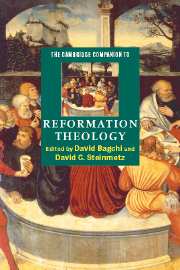Book contents
- Frontmatter
- Introduction
- 1 Late medieval theology
- 2 Lollardy
- 3 Hussite theology and the law of God
- 4 The theology of Erasmus
- 5 Luther
- 6 Melanchthon
- 7 Confessional Lutheran theology
- 8 The theology of Zwingli
- 9 Bucer
- 10 The theology of John Calvin
- 11 John Calvin and later Calvinism
- 12 The theology of Thomas Cranmer
- 13 The theology of the English reformers
- 14 The Scottish Reformation
- 15 An introduction to Anabaptist theology
- 16 Catholic theologians of the Reformation period before Trent
- 17 The Council of Trent
- Conclusion
- Select bibliography
- Index
- Series list
10 - The theology of John Calvin
Published online by Cambridge University Press: 28 May 2006
- Frontmatter
- Introduction
- 1 Late medieval theology
- 2 Lollardy
- 3 Hussite theology and the law of God
- 4 The theology of Erasmus
- 5 Luther
- 6 Melanchthon
- 7 Confessional Lutheran theology
- 8 The theology of Zwingli
- 9 Bucer
- 10 The theology of John Calvin
- 11 John Calvin and later Calvinism
- 12 The theology of Thomas Cranmer
- 13 The theology of the English reformers
- 14 The Scottish Reformation
- 15 An introduction to Anabaptist theology
- 16 Catholic theologians of the Reformation period before Trent
- 17 The Council of Trent
- Conclusion
- Select bibliography
- Index
- Series list
Summary
John Calvin (1509-64) spent most of his adult life as a refugee from his native France. By far his longest exile was in Geneva, a city in which - in spite of his undoubted prominence - he seemed never to feel completely at home. Many of the figures who assisted Calvin in the reform of Geneva - energetic men such as Guillaume Farel and Pierre Viret - were forgotten by time, their books left largely unread after their deaths except by a handful of scholars. But Calvin’s theological influence did not cease with his death in 1564. If anything, it grew stronger, especially in the English-speaking world. Thomas Norton’s translation of Calvin’s Institutes went through eleven editions by 1632. Calvin’s catechism went through eighteen editions in English by 1628. Arthur Golding translated Calvin’s sermons on Job, which went through five editions between 1574 and 1584. In America, the Calvinism of the low-church Anglicans of Virginia, the Congregationalists of Massachusetts, the Scotch-Irish Presbyterians of North Carolina, and the Baptists of Rhode Island was reinforced by the Dutch Calvinism of New Jersey and New York and by the German Calvinism of Pennsylvania. Even John Wesley, the founder of the Methodists, a notably anti-Calvinist movement on the American frontier, once confessed that his theology came within a 'hair's-breadth of Calvinism'.
- Type
- Chapter
- Information
- The Cambridge Companion to Reformation Theology , pp. 113 - 129Publisher: Cambridge University PressPrint publication year: 2004
- 1
- Cited by



